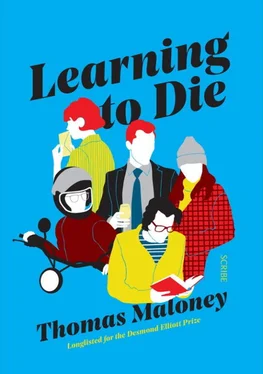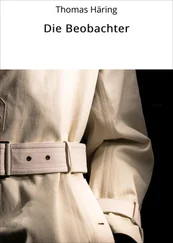‘But I’m only a little girl,’ she complained, ‘and you’re a man. You have to run faster than that.’ She pulled him by the hand, broke away with a mocking laugh, and when she next looked back he was staggering, his mouth gaping in a kind of yawn and his arm flopping about. Then he fell over.
She ran to him, asked him what the matter was. But he just stared up at her, looking sad and strange. She shouted for help but nobody was near enough. She didn’t want to leave him, but when she sat on the ground and said she’d look after him, he pushed her away and seemed to be angry with her. She kept begging him to say something, but he didn’t. Not a word. It was a long time until a passer-by saw them and called an ambulance, and Old Vickers died a few hours later.
In a shocked stupor of guilt, Brenda told the paramedic, ‘We were walking and he just fell over. We were walking really slowly. He just yawned and fell over.’ This was the version of events that the Vickers family first heard, and Brenda has never corrected it.
She feels her ankle begin to turn on a loose rock, and catches it just in time. The deer, traumatised survivors of a recent cull, have completed a lap of the mountain too.
James F. Saunders does not write to a weekly schedule or observe weekends; all days begin alike. Some few turn into good writing days, the others bad. Saturday opens promisingly: the indignant sea tosses spray against his window, dawn hardly bothers to break, and James, having taken nothing stronger than an instant coffee, is having visions. Creative visions. More specifically, he’s losing the ability to distinguish between fact and fiction. Was Gaddafi really real? With those sunglasses, that curling lip? Or was he just another fictional bad guy like Sauron, the Kaiser and Darth Vader? Was James’ aborted English degree a very disappointing novel? His keyboard rattles.
‘Oi, James!’
The deus ex machina . Is that you, Samuel Beckett? Or is it Dmitri Karamazov? Not Mephisto, surely — that would be hackneyed.
‘James, are you up there? Is he up there, Mrs Peacock? James, want to earn a few more quid?’
At the mention of money, reality and fiction begin to disengage. Earn a few quid. Yes. Need to do that. James opens the creaking casement and a gust of salty air rolls in, banishing Muammar and Mephisto from the room.
‘Hello! Rob? Sure. How long for?’
The deal is made swiftly. Once upstairs, James’ charge, a boy named Hugo, follows his every move with huge, tragic eyes.
‘So. What shall we do? Would you like to look in the rock pools? The tide’s dropped.’
Hugo looks disappointed. ‘Actually, I’ve done that several times before,’ he says in a tiny voice, his enunciation much better than his father’s. Then he adds, respectfully, ‘Though it is very interesting.’
‘The museum?’ The disappointed expression remains; it is a very small museum. ‘How about exploring the secret passages in the village? Have you done that? Have you seen where the smugglers hid their cargo?’
A complicated frown spreads like a vine across Hugo’s enormous forehead. His head is far too big for his body, and not quite the right shape.
‘Actually, I don’t think so,’ he replies, carefully.
‘Get your coat on, then. And take some paper so we can draw a map. If we don’t draw a map, we’ll get lost and starve to death.’
James glances back ruefully at the laptop as they leave. Cyril Connolly, the failed writer’s writer, asserted that the only treatment for a writer’s envy of successful and distracted peers is to write. ‘By working,’ goes the line that old Cyril relegated to a footnote, but that jingles so often in James’ head, ‘you are doing what they would most envy you.’ By working — writing — not by babysitting creepy children.
But maybe there’s some material here. Hugo, aged six, is the son of Rob, who rents the adjoining house in the heart of Merryman’s Bay. This house, originally intended by Rob as a base for family fun, became instead the venue for his extramarital assignations with Trudy, a work associate. He has now separated from his wife and lives with Trudy semi-legitimately in Leeds, but the crooked little house, with its bouncy bed and naughty associations, apparently remains useful for rekindling the flames. Rob has his son every other weekend, but makes liberal use of the childcare services of his mother — who lives further up the coast and can often be persuaded to take the boy overnight — as well as various cash-strapped locals.
This much James has inferred from his own observations and the barbed comments of his landlady. Rob doesn’t say much to the Bay locals, though he did wax philosophical yesterday evening, leaning on his BMW, watching Hugo labour up James’ steep stairs with a pile of beloved books and toys. ‘Life, man — it happens to you.’
Rob is not back when he promised, so James takes the boy to the chippie. The weather has brightened and they carry their warm, greasy bundles up a flight of steps and along a path to a bench contemplating the village from the south. A ray of sun catches the red roofs tumbling down towards the sea.
‘This is the fish and chips bench,’ says the boy.
‘It is.’ The boy stares out at the cloud-scuffed horizon.
‘James?’
‘Yes?’
‘Have you got any brothers or sisters?’
‘No. When I was a baby, I cried so much that my parents called it a day. Have you?’
‘Actually, I had a sister. But Mummy said that God wanted her to live in Heaven.’ The boy folds a chip into his small mouth and chews it, frowning. ‘Daddy said that means she came out dead.’ James finds he has no words to answer this abridged family tragedy. ‘Daddy says life goes on,’ the boy adds, with his mouth still full. ‘Mummy says that’s wrong, and she says Daddy’s a callous. But life does go on, doesn’t it?’
James’ sense of adult authority has drained away in the presence of this sorrowful, big-headed boy. It’s not a child but a little man, a philosopher, whose minuscule bottom is perched on the front plank of the bench, feet swinging.
‘Well,’ he replies, ‘I suppose it does and it doesn’t.’
‘This is a backward step, but hardly perceptible.’
Montaigne
Dan Mock considers himself a feminist. In other words, he doesn’t just believe in equality of the sexes, but also that society — even the most enlightened, liberal society — isn’t quite there yet. Of all the campaigns Natalie helps to design, the ones for girls’ education and women’s rights strike him as the most laudable. He rates the empowerment of women in western and other cultures as their greatest achievement of the past century.
In spite of this, sex in the Mock marriage is not a cat-and-cat game, or a mouse-and-mouse game: it’s a cat-and-mouse game, and Dan is nearly always the cat. Today, a Sunday, is day six since they last had sex. Dan is counting, Natalie is not: that’s the difference between them.
Natalie swam a kilometre this morning, which both demonstrated her substantial recovery from the accident and denied Dan his habitual stratagem of pouncing as she comes out of the shower (a moment, he reasons, that might just supply the requisite combination of relaxation and invigoration — though a woman armed with hairdryer and straighteners is no pushover). This coming week he’s working the night shift at the synchrotron — his seniority ensures this happens rarely, but he has to show willing — so their paths will rarely intersect in the bedroom. Six plus another five equals eleven. Dan has factored this in. Natalie, apparently, has not.
In Natalie’s world, sex seems to occupy a place beside going for a walk by the river. Something to consider when more pressing tasks are out of the way; enjoyable, once it gets going; afterwards she might say, ‘We should do that more often.’ But peripheral. Dan envies her this absolute freedom from the sex curse. He suspects, however, that in its place in her mind are mostly mundane concerns — a mental grocery list, what to wear tomorrow, whose birthday is coming up. Is the demon crouching in his own mind better or worse than these?
Читать дальше












